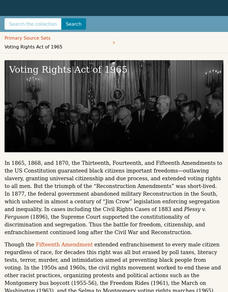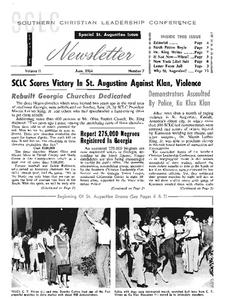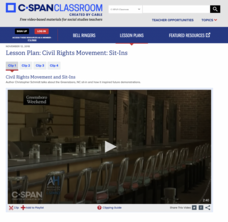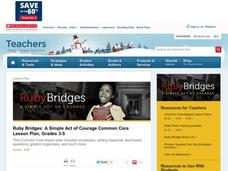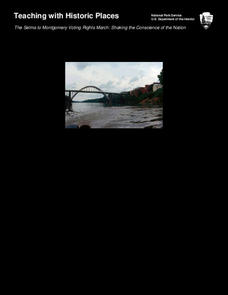Stanford University
Civil Rights or Human Rights?
Young citizens consider the American civil rights movement as part of the global struggle for human rights. After using a timeline activity to learn about the major events in the civil rights movement, class members study Malcolm X's...
Civil Rights 50
Civil Rights at 50
The 50th anniversary of the 1963 March on Washington, President Johnson's signing of the Civil Rights Act of 1964, the Voting Rights Act of 1965, and the Immigration and Nationality Act of 1965 provide the backdrop for a series of lesson...
iCivics
The Road to Civil Rights
Here is a fantastic resource on the civil rights movement! It includes reading materials and worksheets, and particularly highlights major legislation and the role of the judicial branch in the federal government in addressing the...
DocsTeach
From Dred Scott to the Civil Rights Act of 1875: Eighteen Years of Change
What do a photo of Abraham Lincoln, a map for the Battle of Antietam, and the Dred Scott decision all have in common? Learners consider the broader question as they examine documents related to civil rights during the Civil War and...
Stanford University
Civil Rights Act of 1964
Was JFK a fallen Civil Rights hero—or a fraud? Learners examine Kennedy's own words and those of his critics to decide for themselves. After examining Kennedy's actions before his assassination, they determine what sort of legacy he left...
Teaching for Change
A Documents-Based Lesson on the Voting Rights Act
How did the Voting Rights Act affect the daily lives of American citizens? A document-based lesson developed by the Student Non-Violent Coordinating committee (SNCC) presents a case study of the impact of the Voting Rights Act of 1965 on...
PBS
Martin Luther King Jr.: Civil Rights Leader
Expand class members' appreciation of the work of Dr. Martin Luther King, Jr. A powerful resource examines King's speeches, writings, and actions that reveal his deep commitment to a nonviolent approach to Civil Rights. Learners watch a...
Civil Rights Movement Veterans
Timeline of Events: 1960’s Civil Rights Movement of St. Augustine, Florida
A timeline can be a powerful learning tool because it reveals a pattern in events. While few would consider St. Augustine, Florida a hotbed of the 1960s Civil Rights Movement, a selection of background information and a timeline of...
Newseum
Civil Rights: Identifying Community Issues
As part of the social, economic, and legal/political civil rights study, class members brainstorm a list of current civil rights issues that affect their community. Individuals or pairs select one issue to research further. The class...
Digital Public Library of America
Voting Rights Act of 1965
Despite the passing of the Thirteenth, Fourteenth, and Fifteenth Amendments, as well as the passing of the Voting Rights Act of 1965, the struggle to ensure fair voter registration and election procedures continues. Young historians...
Mr. Beem's Social Studies
Civil Rights Project: The Long Civil Rights Movement
Investigate milestones along the path that lead to the American Civil Rights Movement of the 1960s. After researching key people, events, court cases, and legislative orders, teams present their findings as a magazine, newspaper, or...
Freedom Archives
Special St. Augustine Issue
The articles and images in the June 1964 edition of the Southern Christian Leadership Conference Newsletter detail the events in St. Augustine that were instrumental in the passing of the Civil Rights Act of 1964. The stirring images and...
PBS
Rosa Parks: Civil Rights Activist
Scholars examine the courageous efforts made by civil rights activist, Rosa Parks. Discussion questions and a brief writing assignment follows a short film. A photograph and a silent film delve deeper into Park's history and three...
C3 Teachers
Civil Rights: What Made Nonviolent Protest Effective during the Civil Rights Movement?
Sit-ins and boycotts, marches and speeches, songs and demonstrations were hallmarks of nonviolent protest of the civil rights movement. Young scholars research primary and secondary source documents to determine what made nonviolent...
US House of Representatives
Hispanic-American Members of Congress in the Civil Rights Era, 1945–1977
New ReviewDebates around immigration in the news are not new, but they are a defining feature of the Hispanic American experience throughout the twentieth century. Looking through the lens of Hispanic Americans in Congress, class members explore...
UnboundEd Learning
Rosa Parks: The Mother of the Civil Rights Movement
Class members listen to a passage on Rosa Parks, examine images of the Montgomery Bus Boycott, and respond to questions based on the text. They then craft a free-verse poem that recounts her achievements and reveals why she is considered...
C-SPAN
Civil Rights Movement: Sit-Ins
Part of the protests of the Civil Rights Movement were small scale sit-ins at lunch counters. This form of on-the-ground activism is the focus of a C-SPAN resource that includes four video-clips about the sit-ins by pupils at a lunch...
Newseum
Civil Rights: The Five Freedoms
After a close reading of the First Amendment and the five freedoms it guarantees, class members examine the civil rights timeline to see how civil rights groups applied these freedoms to create change. Using the issue the class chose in...
K20 LEARN
Forgotten Figures: The Civil Rights Movement
Most have heard of Dr. Martin Luther King, Malcolm X, and Rosa Parks, but few recall Elizabeth Jennings, Samuel W. Tucker, or Ada Lois Sipuel Fisher. Young historians research and then develop a presentation about the contributions of...
Anti-Defamation League
Martin Luther King, Jr. and Civil Rights
How far have we come and how far do we still need to go to achieve equality and full civil rights in the United States? Include a packet of materials collected in your observance of Martin Luther King, Jr. Day.
Scholastic
Ruby Bridges: A Simple Act of Courage, Grades K-2
A civil rights movement lesson designed specifically with the Common Core State Standards in mind, young learners are introduced to the story of Ruby Bridges as the first African American child to attend an all-white elementary school....
Scholastic
Ruby Bridges: A Simple Act of Courage, Grades 3-5
Through character trait graphic organizers, a vocabulary sorting activity, class discussion, and a civil rights movement slide show, your young historians will be introduced to the amazing story of Ruby Bridges and her experiences as the...
National Park Service
The Selma to Montgomery Voting Rights March: Shaking the Conscience of the Nation
Travel back in time to examine how tragic events can spur positive change. Scholars explore the impact of the Selma Voting Rights March, including the tragic loss of life and the later signing of the Voting Rights Act of 1965. Academics...
Albert Shanker Institute
Heart of the Matter
Most people have heard of Dr. Martin Luther King, Jr. and his famous "I Have a Dream" speech, but few have heard of Philip Randolph and Bayard Rustin. Who were these guys and what did they have to do with this famous landmark event in...
Other popular searches
- Civil Rights Act 1964
- Civil Rights Act of 1964
- Civil Rights Activism
- Civil Rights Act 2001
- Civil Rights Act Canada
- Civil Rights Act 1965
- Civil Rights Act 1866
- Civil Rights Act 1968
- Civil Rights Activists
- Civil Rights Act of 1866
- Jewish Civil Rights Activists
- Civil Rights Activities











